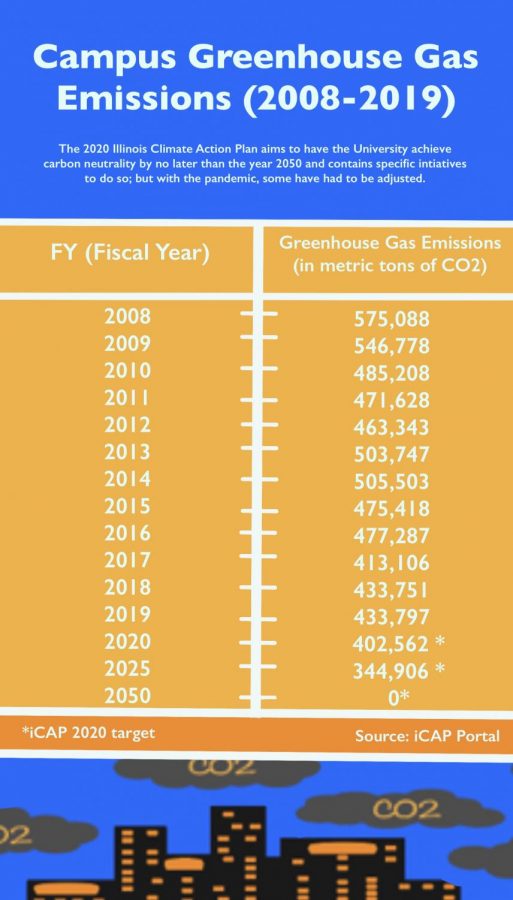COVID-19 pandemic impacts University sustainability goals
December 8, 2020
The COVID-19 pandemic has positively and negatively affected the University’s sustainability goals, but in the long-term, officials and students are hopeful that the school will achieve these goals.
Factors like reduced budgets, less students on campus and use of building space contribute to the University’s changes in sustainability initiatives.
The Illinois Climate Action Plan, or iCAP, outlines goals to have the University become carbon-neutral by 2050.
Morgan White, Facilities and Services associate director for sustainability, said the finishing touches of this year’s update was finished amidst the pandemic.
White also serves as co-chair of the iCAP Working Group, which includes major University representatives and is responsible for developing and executing iCAP 2020.
Get The Daily Illini in your inbox!
“The feedback we got (from the Sustainability Council) was that we really needed to integrate that aspect of the pandemic into the document,” White said.
One example was iCAP Objective 2.2.1, which outlines ways the University can improve space use efficiency by “(increasing) space utilization rates, (removing) outdated and unneeded spaces, and actively (restricting) the growth of total campus GSF.”
White said that COVID made the iCAP team think about needing more space and having the ability of separation for social distancing.
“It didn’t change the goal. The objective is still to have a very efficient use of space,” she said. “But the way that we’re going to do it is going to be impacted by COVID and other pandemics.”
Additionally, White said that the University had a goal of reducing landfill waste by 10% by 2024, but because of the reduced number of students on campus, waste was reduced by 12% during this semester alone.
“I don’t expect it will last, it’ll probably go back to what it was. But we’re working on it. That’s a short-term win,” she said.
COVID-19 also led to iCAP Objective 3.4.3, which aims to establish a telecommuting program by 2024 to encourage University employees to work from home.
White said reducing transportation has always been a goal and the pandemic gave the iWG one opportunity to do so with the increased use of Zoom.
But one other casualty of the pandemic was the reduced budget, affecting sustainability programs and organization funding.
Joe Edwards, Ph.D. candidate in LAS and Chair of the Student Sustainability Committee, said SSC’s budget went from $1.5 million to $250,000 due to financial cuts.
The $12 Sustainable Campus Environment Fee and the $2 Cleaner Technologies Fee paid by students every year and normally funds SSC was cut by the University for Spring 2021.
Brian Farber, executive assistant to the associate vice chancellor for Student Affairs, said the goal of the cuts was to make temporary reductions where possible while still providing excellent services to the student body.
“In Student Affairs, we will do whatever is necessary to serve every student. Every time. Wherever they might be,” Farber said. “These reductions are painful for the bottom line of all of these programs.”
Edwards said that while it’s important to shift financial burdens from students during this time, the fee allocation could’ve been more equitable across departments.
SSC normally funds a lot of the projects that are outlined in iCAP, but because of the reduced budget, they couldn’t do so this semester, he said.
For example, iCAP has goals to reduce transportation and one way to do so is making the campus more bike-friendly through construction of bike paths. Funding for these paths comes from SSC, Edwards said.
Edwards advised many projects to reduce their budget to the absolute minimum in order to survive the year.
“This shake-up of our collective psyche that came with COVID really shifted some perspectives away from investing in long-term infrastructure,” Edwards said. “I don’t think it hurt our ambition too much, it just hurt our ability.”
For Edwards, the pandemic could affect the future implementation of iCAP-related programs and University sustainability overall.
“Every step counts, we have to make our incremental progress,” he said. “And if we can’t make that progress this year, then that puts us all the way off leading into the future.”
As for positives, Edwards said the University has “cool” goals for renewable energy with the construction of a third solar farm. He said the University could be powered by 100% renewable energy within a few years.
iCAP 2020 states that energy consumption is the greatest contributor to the University’s total greenhouse gas emissions.
Data on net total emissions has been annually tracked since 2008 and has decreased from about 575,000 metric tons of carbon dioxide to about 433,000 metric tons in 2019.
Mohamed Attalla, executive director of Facilities and Services, said there are lots of initiatives to reach carbon neutrality in terms of energy and hopes to reach 400,000 metric tons of CO2 this year.
Attalla said the addition of a third solar farm, advances in geothermal energy and research in carbon capture contribute to achieving carbon neutrality and that long-term, COVID-19 should not be a problem.
“Maybe we’re behind a little in implementing some projects, but we’ll be able to catch up,” he said. “I don’t think there will be a long-term impact on the iCAP implementation.”
White also said she doesn’t anticipate any long-term problems with achieving the iCAP goals and believes it’s important for the University to lead by example when it comes to sustainability.
“I really believe that accomplishing the iCAP goals is something we can do, we need to do and we will do,” she said.
“Climate change isn’t waiting for us,” Edwards said. “(The University is) the laboratory for science, for humanities, for arts … all those kinds of things show what is possible of humanity.”
“If we’re going to call ourselves leaders, then we need to lead,” he said.







